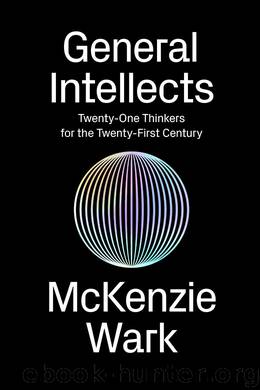General Intellects by Mckenzie Wark

Author:Mckenzie Wark
Language: eng
Format: epub
Publisher: Verso Books
The missing concept there for me is information. It is no accident that neoliberalism has its moment in the postwar period, when the infrastructure of command and control through information that had developed during the war for managing complex systems was extended out of the military industrial complex into civilian industry.
Hayek had said that only the price signal could function as a rational management of information in a complex economy, and yet as Ronald Coase showed, market transactions are not free.11 In cases where the cost of market transactions outweighed their efficiency, the nonmarket organizational form of the firm would prevail. The corporation emerged as a truly enormous nonmarket form of resource allocation. The state is called upon to perform all sorts of functions to enable these behemoths to coexist and survive. Meanwhile, the ideological fixation on “competition” covered up the lack of it.
For neoliberalism, “the economy is at once model, object and project” (62). Precisely because it can only be an artificial construct at this point. Civil society seems to have worked its charms on Foucault. He could not see the other side of the picture. Looked at from the point of view of neoliberalism, the state has to become more like the market. (And one can celebrate or decry that proposition.) But one can also see it the other way around: the market has to be propped up and kept going by the state.
The developed world became the overdeveloped world. Commodification ran up against the limits of what it could claim to organize efficiently or effectively. Whole chunks of social life had to be hacked off and fed into the flames to keep the steam up. Commodification moved on from land to things to information. A whole infrastructure grew, of information vectors, backed up by the growth of “intellectual property” into a comprehensive set of full private property rights. This for me would be a sketch that makes sense of neoliberalism as effect rather than cause.
If “economy” is not a static, unmoving thing in the postwar period, neither is the “state.” Both are transformed by the same techne. As Sandra Braman shows, the functions of the state start to work differently when what the state runs on is information.12 If there’s a connection between state and private organizational units in the postwar period, it is that they both run on the same computational infrastructure, from the mainframe era to the PC to today’s so-called cloud computing. One might wonder, with Chun, if these were the vector more of military rationalities than of market ones. This would help make sense of an aporia in Foucault and Brown: that the neo-liberal subject is not only autonomous and self-managing, but also obeys commands. Autonomy is constrained. Initiative is welcome but only in fulfilling a task commanded from without. This is the principle of military organization.
One might also wonder if it is not at least in part from the generalization of military models that inequality becomes naturalized and normalized. It is certainly
Download
This site does not store any files on its server. We only index and link to content provided by other sites. Please contact the content providers to delete copyright contents if any and email us, we'll remove relevant links or contents immediately.
| Books & Reading | Comparative Literature |
| Criticism & Theory | Genres & Styles |
| Movements & Periods | Reference |
| Regional & Cultural | Women Authors |
4 3 2 1: A Novel by Paul Auster(12354)
The handmaid's tale by Margaret Atwood(7727)
Giovanni's Room by James Baldwin(7301)
Asking the Right Questions: A Guide to Critical Thinking by M. Neil Browne & Stuart M. Keeley(5740)
Big Magic: Creative Living Beyond Fear by Elizabeth Gilbert(5725)
Ego Is the Enemy by Ryan Holiday(5391)
The Body: A Guide for Occupants by Bill Bryson(5065)
On Writing A Memoir of the Craft by Stephen King(4914)
Ken Follett - World without end by Ken Follett(4705)
Adulting by Kelly Williams Brown(4552)
Bluets by Maggie Nelson(4534)
Eat That Frog! by Brian Tracy(4499)
Guilty Pleasures by Laurell K Hamilton(4422)
The Poetry of Pablo Neruda by Pablo Neruda(4079)
Alive: The Story of the Andes Survivors by Piers Paul Read(4009)
White Noise - A Novel by Don DeLillo(3990)
Fingerprints of the Gods by Graham Hancock(3979)
The Book of Joy by Dalai Lama(3959)
The Bookshop by Penelope Fitzgerald(3827)
